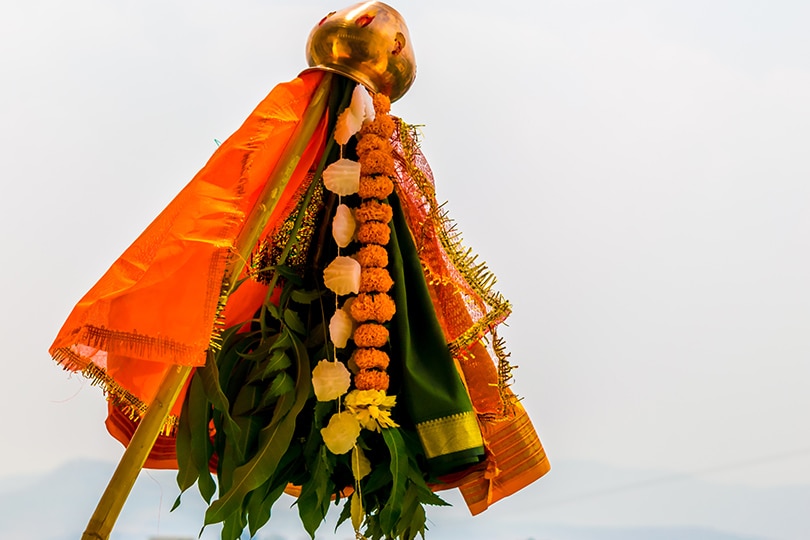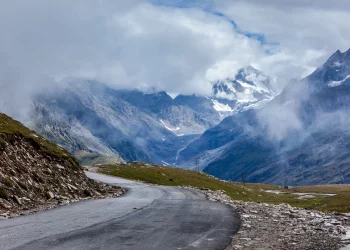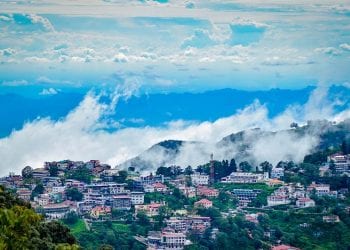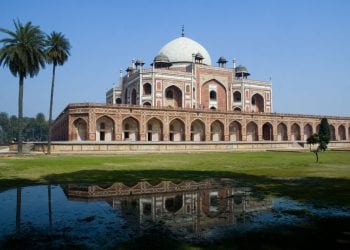Gudi Padwa: A Celebration of New Beginnings
Gudi Padwa marks the beginning of the Hindu New Year. This occasion is based on the Hindu lunisolar calendar. It is believed to commemorate the day of creation, where Lord Brahma is said to have recreated the world after a catastrophic flood.
During the celebration, people feast on delectable cuisine and enjoy cultural displays of folk dances like Ranamale and Veerabhadra. The Hindu New Year festival of Gudi Padwa marks the conclusion of Shigmotsav.
How is Gudi Padwa Celebrated in India?
On Gudi Padwa, families create beautiful rangolis with powder colors, flowers, and petals on the floors of their homes to welcome guests and loved ones. A special Gudhi flag is made with garlands of flowers, mango, and neem leaves, and topped with a silver or copper vessel. Decorations include brightly colored flowers and torans adorning the doors, which are believed to bring positivity.
The day starts with a holy bath in a river, followed by temple visits and prayers. Women wear traditional nine-yard sarees and adorn their hair with mogra flower garlands, while men don classic kurta pajamas and saffron turbans.
Sweet treats like Puran Poli and Shrikhand and savoury dishes like Aambe Dal and Sunth Paak are prepared and enjoyed by the whole family. The bitter-sweet Gudi Padwa prasad made with neem leaves and jaggery symbolizes the ups and downs of life.
Gift-giving is also a significant part of the festival, with elder members offering clothes, money, and other gifts to the family’s younger members. Street processions known as Prabhat Pheri, featuring saffron-coloured turbans and followed by dance and food festivals, are held throughout Maharashtra. There are plenty of family hotels in Maharashtra where tourists and pilgrims can lodge comfortably and participate in the festivities.
Meaning of ‘Gudhi’
‘Gudhi’ is an emblematic decoration that signifies victory, happiness, and prosperity. It consists of yellow or saffron cloth adorned with gold zari, tied to the top of a long bamboo pole. The decoration is then topped with mango leaves, sugar crystals, mango leaves, & a garland of flowers, ending with an inverted copper pot.
The Gudhi is typically tied outside the home on the right side of the main entrance. This symbolizes King Shalivahana’s triumph over the Sakas or Lord Rama’s victory upon his return to Ayodhya after defeating Ravana. The Gudhi is a talisman to keep evil at bay and bring good luck and prosperity into the home.
In addition to being a symbol of triumph and prosperity, Gudhi is also seen as the ideal time to embark on new endeavours. The festival is called Samvatsar Padvo in Goa, and the day prior is marked by thorough spring cleaning. Village households will thoroughly clean their courtyards, apply fresh cow dung, and prepare exceptional food, drinks, and sweets.
As a symbol of fresh starts, people dress in new clothing and adorn their homes with beautiful Rangoli designs. These customs are especially prevalent in villages, where tradition is deeply revered.
Best Places To Visit During Gudi Padwa
Khawa at Royal Tulip, Navi Mumbai
Indulge in top sightseeing in Maharashtra and its delicious cuisine with friends and family at Khawa, located in Royal Tulip, Navi Mumbai.
Ganesh Mandir in Dombivali
Celebrate the joyous festival of Gudi Padwa with a grand and glorious procession, known as the Shoba Yatra, organized by the Ganesh Mandir in Dombivali. Stay overnight in the best family hotels in Dombivali to get the most out of this occasion with your family.
Diva Maharashtracha in Mahim
For a true taste of authentic Marathi food, head to Diva Maharashtracha during the celebration of Gudi Padwa. Whether you’re new to Maharashtrian cuisine or a seasoned connoisseur, you won’t be disappointed.
Mumbai Chowpatty
Take a break and savour the local snacks at the popular tourist destination, Mumbai Chowpatty, which is the perfect place to be during the celebration of Gudi Padwa 2023.
Girgaon Rally
Welcome the new year in Mumbai style with the Girgaon Gudi padwa rally, where women participants don traditional Maharashtrian attire and ride motorcycles.
Celebrate Gudi Padwa by venturing on top sightseeing in these places with those closest to you, creating cherished memories with your family and friends.
Recent Posts
Top Picks

- OYO
 15 April, 2024
15 April, 2024 - Cultural Tour

- OYO
 15 April, 2024
15 April, 2024 - Cultural Tour

- OYO
 15 April, 2024
15 April, 2024 - Cultural Tour

- OYO
 15 April, 2024
15 April, 2024 - Cultural Tour

- OYO
 15 April, 2024
15 April, 2024 - Cultural Tour

Please rotate your device
Please go back to portrait mode for the best experience





 April 15, 2024
April 15, 2024 



